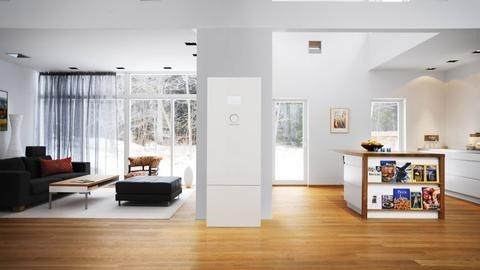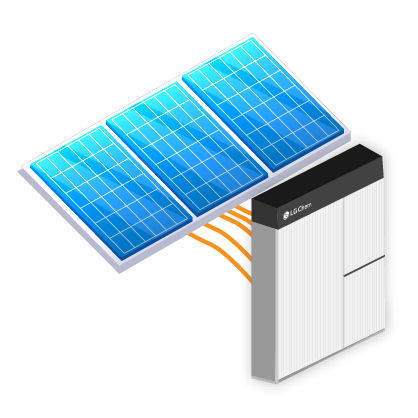Home Battery Backup Main Event – sonnenBatterie vs. LG
We recently wrote an article comparing Sonnen’s Eco and Teslas’s Powerwall 2, but now we’re going to see how the Eco stacks up against the new battery on the block: the LG Chem RESU 10.
LG Chem, a subsidiary of LG, is one of the largest global producers of lithium-ion batteries. Much like Mercedes, they also have experience manufacturing electric vehicle batteries. In fact, LG Chem is the largest automotive battery manufacturer in the world and has partnerships with 16 of the top 29 automakers. The company supplies batteries for many electric vehicles including the Chevy Volt and the Ford Focus. The South Korean manufacturer entered the home energy storage system industry in 2010, but the RESU product line is their first venture into the US residential market for home battery backup.
While LG Chem is just entering the US residential energy storage market, Sonnen has been selling batteries in the country since 2015. The company opened a Los Angeles headquarter in 2016 and recently announced the creation of a development and manufacturing center in Atlanta, GA for all of their US products.
A battery from either company will allow you to be more energy independent. In the event of a power outage, for example, both can provide you with energy security and the ability to continue with your daily routine. However, though Sonnen and LG Chem batteries both offer the benefits of energy home storage, there are some key distinctions to take into consideration when deciding which is right for you.
Pricing

The RESU 10H has a 9.8 kWh battery of usable capacity, so its closest Sonnen counterpart would be the Eco 10, at 10kWh. The 214lb RESU 10H starts out at around $10,000 while an Eco 10 costs about $16,000 and weighs about three times as much at 622lbs. LG Chem claims that the RESU 10H (and its smaller counterpart, the RESU 7H) has the best energy density in the world. The RESU 10H’s lighter weight means that it can also be mounted on the wall, while the Eco 10 must be installed on the floor.
The weight and price difference can be partly explained by the fact that the Eco 10 is fully integrated, while the RESU 10H does not include an inverter. The RESU 10H is currently compatible with SMA, Fonius’ Symo Hybrid, and SolarEdge’s StorEdge inverters, and LG Chem announced that more companies would be added in time (SolarCity also offers an exclusive Delta inverter if you purchase the RESU 10H through them). SolarEdge’s StorEdge has the added benefit of operating as a single inverter for both solar PVs and home batteries, therefore reducing overall system energy losses.
Though LG Chem has at this point only officially announced three main inverters that the RESU 10H is compatible with, homeowners will likely be able to pair the battery with a wider range of inverters than most batteries in the long run. This is because the RESU 10H is a 400-volt energy storage system. The higher voltage gives homeowners greater flexibility in how they can wire their solar system and the type of home storage and inverter combinations they can utilize.
Software

The Eco 10 comes standard with Sonnen’s phenomenal software. It has an application program interface (API) and utility communication capacity that gives it demand response and frequency regulation capabilities. The Eco 10 can also recognize your consumption patterns and then adjust your usage accordingly to maximize your energy storage efficiency. This is a great asset for owners with utilities that have Time-Of-Use structures. Under a Time-Of-Use scheme, utilities raise the price of electricity during certain peak hours. The Eco 10 lets you store your excess energy and then set the time at which you want to use it, allowing you to avoid pay peak time rates when electricity is more expensive.
At this point, it is unclear exactly what type of intelligent software, if any, accompanies the RESU 10H. LG Chem put out a press release when the RESU 10H was first released in Australian and New Zealand markets in July 2016. The company has failed to release more detailed information about the battery since then, other than a basic system statistics sheet.
Warranty
Both LG Chem and Sonnen are highly bankable companies, which gives potential buyers peace of mind knowing that both companies will almost certainly be around in the next decade to deliver on their warranty promises. The Eco 10 is under warranty to perform at 70% capacity for ten years, or for 10,000 cycles. The RESU 10H has an expected lifespan of ten years or 6,000 cycles under proper use conditions. It is warranted for 80% of nominal energy for seven years, and 60% after ten years. Sonnen offers one of the longest production warranties in the industry at 10,000 cycles, which gives it a lower cost per battery cycle than the RESU 10H.

The Winner
LG Chem has successfully installed home energy storage systems in other countries around the world, but this is their first foray into the United States. Sonnen already has a proven track record in the country. Though their batteries are costlier on the surface, they are fully integrated systems which have the technology to help you save even more money. Furthermore, the Eco 10 warranty lasts for 10,000 cycles at 70% for ten years, while the RESU 10H only offers 60% capacity after ten years. Ultimately, your decision may come down to how good of a deal you might be able to get on a RESU 10H, an inverter, and software. Consider, however, that even if that price is lower than that of the Eco 10, Sonnen is still offering a better warranty.
Want to learn more about the RESU 10H, the Eco 10, or any of sonnen or LG Chemical’s other batteries? Click the button below! At Solar.com we can assist your decisions when it comes to going solar as well as your home battery backup options.








